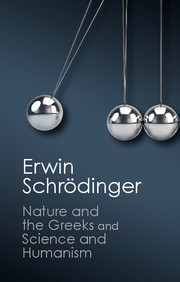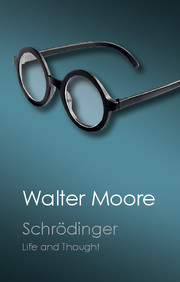'Nature and the Greeks' and 'Science and Humanism'
Nobel laureate Erwin Schrödinger was one of the most distinguished scientists of the twentieth century; his lectures on the history and philosophy of science are legendary. 'Nature and the Greeks' and 'Science and Humanism' makes available for the first time in many years the texts of two of Schrödinger's most famous lecture series. 'Nature and the Greeks' offers a comprehensive historical account of the twentieth-century scientific world picture, tracing modern science back to the earliest stages of Western philosophic thought. 'Science and Humanism' addresses some of the most fundamental questions of the century: what is the value of scientific research? And how do the achievements of modern science affect the relationship between material and spiritual matters? A foreword by Roger Penrose sets the lectures in a contemporary context, and affirms they are as relevant today as when they were first published.
- Nobel laureate Erwin Schrödinger was one of the most distinguished scientists of the twentieth century
- Makes available two sets of texts from Schrödinger's most famous lecture series
- Includes a foreword by Roger Penrose, setting the lectures in a contemporary context
Product details
November 2014Paperback
9781107431836
184 pages
215 × 138 × 9 mm
0.26kg
15 b/w illus.
Available
Table of Contents
- Foreword
- Part I. Nature and the Greeks:
- 1. The motives for returning to ancient thought
- 2. The competition, reason v. senses
- 3. The Pythagoreans
- 4. The Ionian enlightenment
- 5. The religion of Xenophanes, Heraclitus of Ephesus
- 6. The atomists
- 7. What are the special features?
- Part II. Science and Humanism:
- 1. The spiritual bearing of science on life
- 2. The practical achievements of science tending to obliterate its true import
- 3. A radical change in our ideas of matter
- 4. Form, not substance, the fundamental concept
- 5. The nature of our 'models'
- 6. Continuous descriptions and causality
- 7. The intricacy of the continuum
- 8. The makeshift of wave mechanics
- 9. The alleged breakdown of the barrier between subject and object
- 10. Atoms or quanta – the counter-spell of old standing, to escape the intricacy of the continuum
- 11. Would physical indeterminacy give free will a chance?
- 12. The bar to prediction, according to Niels Bohr
- Literature.



